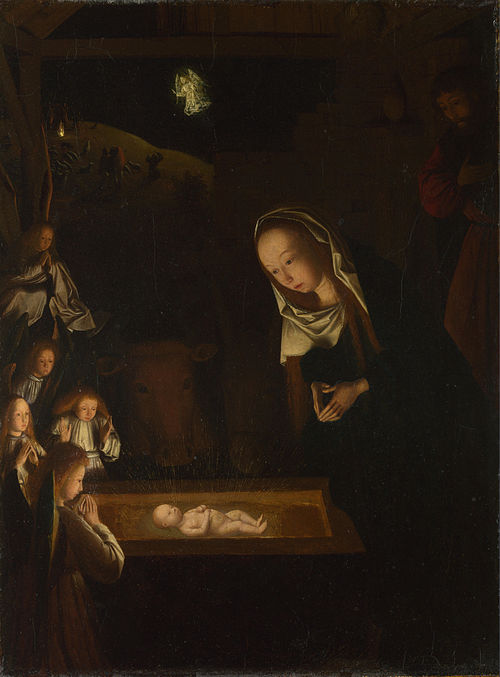Mangernoun
A trough for animals to eat from.
Mangernoun
A trough or open box in which fodder is placed for horses or cattle to eat.
Mangernoun
The fore part of the deck, having a bulkhead athwart ships high enough to prevent water which enters the hawse holes from running over it.
Mangernoun
a container (usually in a barn or stable) from which cattle or horses feed
Mangernoun
a long trough from which horses or cattle feed.
Manger
A manger or trough is a rack for fodder, or a structure or feeder used to hold food for animals. The word comes from the Old French mangier (meaning ), from Latin mandere (meaning ).Mangers are mostly used in livestock raising and generally found at stables and farmhouses.
Stablenoun
A building, wing or dependency set apart and adapted for lodging and feeding (and training) animals with hoofs, especially horses.
Stablenoun
(metonymy) All the racehorses of a particular stable, i.e. belonging to a given owner.
Stablenoun
(Scotland) A set of advocates; a barristers' chambers.
Stablenoun
An organization of sumo wrestlers who live and train together.
Stableverb
(transitive) to put or keep (an animal) in a stable.
Stableverb
(intransitive) to dwell in a stable.
Stableverb
to park (a rail vehicle)
Stableadjective
Relatively unchanging, permanent; firmly fixed or established; consistent; not easily moved, altered, or destroyed.
Stableadjective
(computing) Of software: established to be relatively free of bugs, as opposed to a beta version.
Stableadjective
That maintains the relative order of items that compare as equal.
Stableadjective
Firmly established; not easily moved, shaken, or overthrown; fixed; as, a stable government.
Stableadjective
Steady in purpose; constant; firm in resolution; not easily diverted from a purpose; not fickle or wavering; as, a man of stable character.
Stableadjective
Durable; not subject to overthrow or change; firm; as, a stable foundation; a stable position.
Stableadjective
So placed as to resist forces tending to cause motion; of such structure as to resist distortion or molecular or chemical disturbance; - said of any body or substance.
Stableverb
To fix; to establish.
Stableverb
To put or keep in a stable.
Stableverb
To dwell or lodge in a stable; to dwell in an inclosed place; to kennel.
Stablenoun
A house, shed, or building, for beasts to lodge and feed in; esp., a building or apartment with stalls, for horses; as, a horse stable; a cow stable.
Stablenoun
a farm building for housing horses or other livestock
Stableverb
shelter in a stable;
Stableadjective
resistant to change of position or condition;
Stableadjective
firm and dependable; subject to little fluctuation;
Stableadjective
not taking part readily in chemical change
Stableadjective
maintaining equilibrium
Stableadjective
showing little if any change;
Stableadjective
(of an object or structure) not likely to give way or overturn; firmly fixed
Stableadjective
(of a patient or their medical condition) not deteriorating in health after an injury or operation
Stableadjective
sane and sensible; not easily upset or disturbed
Stableadjective
not likely to change or fail; firmly established
Stableadjective
not liable to undergo chemical decomposition, radioactive decay, or other physical change
Stablenoun
a building set apart and adapted for keeping horses
Stablenoun
an establishment where racehorses are kept and trained
Stablenoun
the racehorses of a particular training establishment.
Stablenoun
an organization or establishment training or producing a particular type of person or product
Stableverb
put or keep (a horse) in a stable
Stableverb
put or base (a locomotive or train) in a depot
Stable
A stable is a building in which livestock, especially horses, are kept. It most commonly means a building that is divided into separate stalls for individual animals and livestock.


















